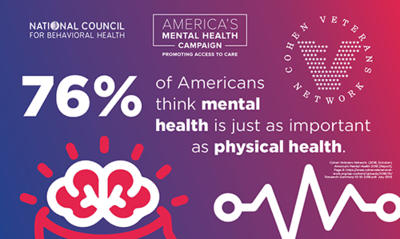May Is Mental Health Awareness Month
Mental Health Awareness Month has been observed in May in the United States since 1949 and was created by the Mental Health America organization.
If you or someone you care about feels overwhelmed with emotions like sadness, depression or anxiety, or like you want to harm yourself or others call 911. You can also contact the Substance Abuse and Mental Health Services Administration’s (SAMHSA) Disaster Distress Helpline at 800-985-5990, the National Suicide Prevention Lifeline at 800-273-8255 or text MHFA to 741741 to talk to a Crisis Text Line counselor.
Isolation from friends and family, job loss and death are challenges we’re all facing during these days of COVID-19. You are not alone. COVID-19 is affecting families across the world. It's very important to do the best we can to stay connected to the ones we love while practicing social distancing. Knowing that we are there for each other to support one another is so crucial, especially if your loved one may be facing a mental health concern.
Here are some tips from the MHFA to help in reaching out to someone you know who has a mental health concern.
- Treat the person with respect and dignity. Listen non-judgmentally, and respect the person’s privacy and confidentiality.
- Offer consistent emotional support and understanding. In difficult times, we all need additional love and understanding. Remember to be empathetic, compassionate, and patient.
- Have realistic expectations. Accept the person as they are. Tough times can make it harder than usual to do everyday activities like cleaning the house, paying bills, or feeding the dog.
- Give the person hope. Remind your loved one that with time and treatment, they will feel better and there is hope for a more positive future.
- Provide practical help. Offer help with overwhelming tasks, but be careful not to take over or encourage dependency. For example, offer to bring groceries over.
- Offer information. Provide information and resources for additional support, including self-help strategies and professional help.
Feelings of worry, stress or fear can be scary and affect your mental and physical health. It’s important to remember that these feelings are normal, especially during a crisis, and can vary in severity from mild uneasiness to intense emotions depending on the person.
According to the Centers for Disease Control and Prevention (CDC), the COVID-19 pandemic can cause strong feelings of stress for adults and children, including:
- Fear and worry about your own health and the health of your loved ones
- Changes in sleep or eating patterns
- Difficulty sleeping or concentrating
- Worsening of chronic physical health problems
- Worsening of mental health conditions
If you’re experiencing any of these, there are ways to manage your symptoms and cope while maintaining social distancing. The Centers for Disease Control and Prevention (CDC) recommends a few ways to cope with feelings of stress, including:
- Take breaks from the news, including on social media.
- Take care of your body with healthy meals, exercise and deep breathing techniques.
- Take time to relax and do at-home activities you enjoy.
- Connect with your loved ones.
The World Health Organization (WHO) also recommends key self-care strategies to take care of your mental health and well-being while at home:
- Maintain a healthy lifestyle, including appropriate sleep, exercise, and diet.
- Don’t use alcohol or other drugs to cope with feelings of sadness or anxiety.
- Follow a credible source for information about COVID-19, such as World Health Organization (WHO) or Centers for Disease Control and Prevention (CDC).
- Limit how much time you spend watching or listening to news that makes you upset.
- Use coping mechanisms that have helped you in the past during difficult situations.
Here's another Resource: Drama Therapy
When you subscribe to the blog, we will send you an e-mail when there are new updates on the site so you wouldn't miss them.








































